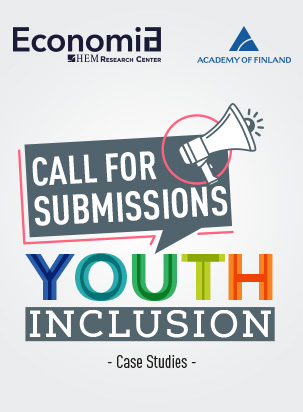
- English
- Français
Economia HEM Research Center (Morocco) is launching a case studies e-book on “Youth Inclusion” , which is part of the “What Works Projects” leaded by Tampere University (Finland) and is now calling for submissions from researchers.
OVERVIEW :
Social entrepreneurship has recently been discussed as a missing link between entrepreneurship, social change and sustainable development (Abdou et al. 2010; Rizk & Azzamy 2016). It is hoped that social entrepreneurs create sustainable business models that promote positive social change and inclusive economic growth. Small and medium-sized businesses thrive in the informal and formal economies of the MENA region (Minialai, 2016). While Egypt has the largest proportion of internationally acknowledged social entrepreneurs, Morocco and Tunisia lag far behind (Ismail &Yehiya 2016). However, the phenomenon of social entrepreneurs in the late 2010 remains understudied : How do support mechanisms, incubation practices and income generation work out for today’s young social entrepreneurs in practice? The SAHWA data indicates that entrepreneurship is among the main aspirations of young people, but the risks involved, the lack of initial capital and the legal and economic hurdles are not conducive to such ventures. Social Innovation is a step further regarding social entrepreneurship, in the sense that it highlights the positive impacts supposed to be generated by the economic activity in the same way as the innovation process and/or idea behind it. Through that book, we aim at sharing youth inclusion through social innovations with educators, students and professionals (both from private entreprises and NGO). This book will gather in different chapters management case studies that can be used both for teaching purposes and as a dissemination tool of innovative practices in the social and economic environments. Therefore the ‘story-telling’ part of the case needs to be taken into account, and the cases will be designed to encourage discussions and decision-making questions at a Masters Degree level (and above). However, the submission does not have to include a teaching note.
We welcome submissions addressing social innovations in one of the following fields, remembering at all times that the cases should focus on the youth inclusion impacts of the initiatives:
SCIENTIFIC COMMITTEE :
DEADLINES AND SUBMISSION GUIDELINES :
Manuscripts will be submitted in electronic format to ebook.socialinnovations@gmail.com before January 10th, 2022.
All manuscripts must include a 150 to 250-word abstract, 2 to 5 keywords, and a 50-word maximum biographical statement for each author.
All manuscripts must adhere to the following format :
Manuscript length (including all pages, tables, and figures) should be no longer than 3000 words.
Manuscript submissions should be submitted in Microsoft Word. The manuscript should be double-spaced, A4 paper dimensions, using a 12-point font size and a default typeface (Times New Roman).
Key Dates :
If you have any questions, please contact: ebook.socialinnovations@gmail.com
Download the call of submissions PDF version here
Editors :
• Manal EL ABBOUBI, University Mohamed V Rabat, Economia HEM Research Center
manal.elabboubi@um5.ac.ma
• Nabil EL MABROUKI, University Cadi Ayyad Marrakech, Economia HEM Research Center
mo.elmabrouki@uca.ma
• Caroline MINIALAI, Economia HEM Research Center
caroline.minialai@gmail.com